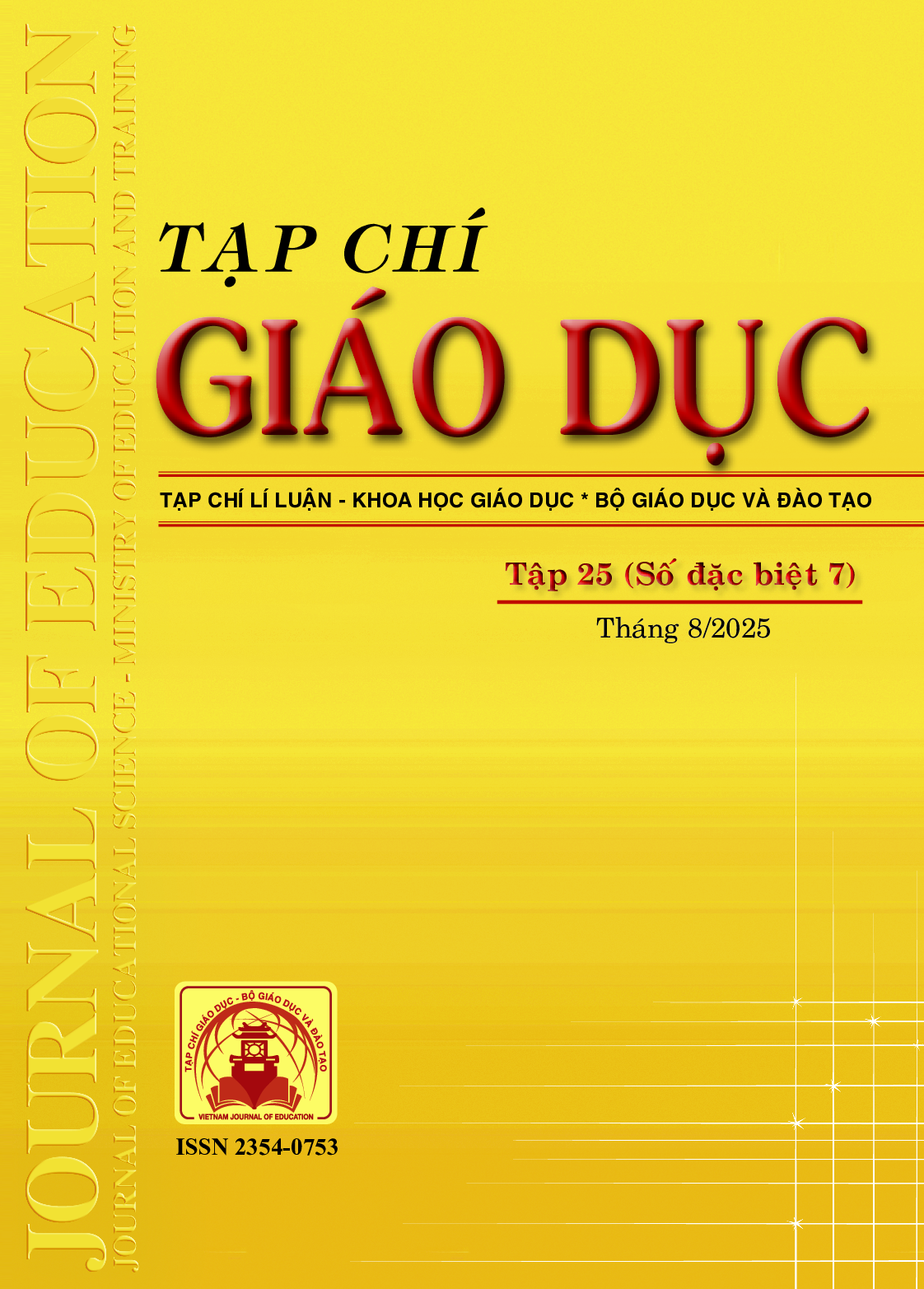Phát triển trí tuệ cảm xúc (EQ) cho trẻ mẫu giáo thông qua trò chơi học tập: Nghiên cứu tại một số trường mầm non trên địa bàn thành phố Hà Nội
Tóm tắt
Emotional intelligence (EQ) is increasingly considered an important factor contributing to the formation of personality and social skills for children from the early stages of life. Choosing and organizing games to develop EQ for preschool children is attracting the attention of many preschool educators, which opens up many opportunities to contribute to improving the effectiveness of organizing educational activities for children, promoting the quality of education. The article systematizes the theory of EQ and learning games. Conducting a survey on the current awareness of preschool teachers on this issue, the results showed that teachers have positive awareness but lack effective implementation methods. On that basis, the article introduces some specific games to develop EQ components such as: emotional recognition, emotional expression, emotional regulation, empathy and cooperation in preschool children. Initially, research shows that developing EQ through learning games is a feasible direction, contributing to improving the quality of emotional education for children if applied properly and with professional support.
Tài liệu tham khảo
Al-Thani, T. (2024). The Elaboration and Equilibration between Emotional Intelligence and Emotional Regulation in Preschool Settings. Mental Health & Human Resilience International Journal, 8(2), 1-5. [https://doi.org/10.23880/mhrij-16000257](https://doi.org/10.23880/mhrij-16000257)
Ban Chấp hành Trung ương (2013). Nghị quyết số 29-NQ/TW ngày 04/11/2013 về đổi mới căn bản, toàn diện giáo dục và đào tạo đáp ứng yêu cầu công nghiệp hóa, hiện đại hóa trong điều kiện kinh tế thị trường định hướng xã hội chủ nghĩa và hội nhập quốc tế.
Berlibayeva, M. (2021). Basic techniques and methods of developing emotional intelligence in preschool children. Pedagogy and Psychology, 46(1), 176-185. [https://doi.org/10.51889/2021-1.2077-6861.24](https://doi.org/10.51889/2021-1.2077-6861.24)
Boyatzis, R. E., Goleman, D., & Rhee, K. (2000). Clustering competence in emotional intelligence: Insights from the Emotional Competence Inventory (ECI). Handbook of emotional intelligence, 99(6), 343-362.
Bộ GD-ĐT (2021). Chương trình giáo dục mầm non (ban hành kèm theo Thông tư số 01/VBHN-BGDĐT ngày 13/4/2021 của Bộ trưởng Bộ GD-ĐT).
Dubovyk, S. H., Mytnyk, A. Y., Mykhalchuk, N. O., Ivashkevych, E. E., & Hupavtseva, N. O. (2020). Preparing Future Teachers for the Development of Students’ Emotional Intelligence. Journal of Intellectual Disability - Diagnosis and Treatment, 8(3), 430-436. [https://doi.org/10.6000/2292-2598.2020.08.03.20](https://doi.org/10.6000/2292-2598.2020.08.03.20)
Goleman, D. (2006). Emotional intelligence: [why it can matter more than IQ] (Bantam 10t). Bantam Books, New York. [https://search.worldcat.org/title/75970405](https://search.worldcat.org/title/75970405)
Hein, S. (1996). EQ for everybody: A practical guide to emotional intelligence (Limited 1s). Aristotle Press. [https://www.amazon.com/EQ-everybody-practical-emotional-intelligence/dp/096553930X](https://www.amazon.com/EQ-everybody-practical-emotional-intelligence/dp/096553930X)
Mannweiler, M., Schuermann, H., Peechatka, A., & Kahn, J. (2023). Biofeedback-Based Videogames: Fostering Emotion Regulation at a Diverse Community Summer Camp. Games for Health Journal, 12(5), 350-357. [https://doi.org/10.1089/g4h.2023.0013](https://doi.org/10.1089/g4h.2023.0013)
Mayer, J. D., Roberts, R. D., & Barsade, S. G. (2008). Human Abilities: Emotional Intelligence. Annual Review of Psychology, 59(1), 507-536. [https://doi.org/10.1146/annurev.psych.59.103006.093646](https://doi.org/10.1146/annurev.psych.59.103006.093646)
Nguyễn Quang Uẩn (2005). Tâm lí học đại cương. NXB Đại học Quốc gia Hà Nội.
Nguyễn Thị Ánh Tuyết, Nguyễn Thị Như Mai, Đinh Thị Kim Thoa (2003). Tâm lí học trẻ em lứa tuổi mầm non. NXB Đại học Sư phạm.
Nogaeva, A. K., & Sangilbayev, O. S. (2023). Empirical Study of the emotional intelligence formation of preschool children. Eurasian Journal of Current Research in Psychology and Pedagogy, 1, 42-50. [https://doi.org/10.46914/2959-3999-2023-1-1-42-50](https://doi.org/10.46914/2959-3999-2023-1-1-42-50)
Papoutsi, C., Drigas, A., Skianis, C., Skordoulis, C., & Pappas, M. (2024). “The Park of Emotions”: A Serious Game for the Development of Emotional Intelligence in Children. Applied Sciences, 14(14), 6067. [https://doi.org/10.3390/app14146067](https://doi.org/10.3390/app14146067)
Phan Thị Thuý Hằng (2024). Giáo dục kĩ năng cảm xúc xã hội cho trẻ mẫu giáo 5-6 tuổi qua hoạt động vui chơi. Luận án tiến sĩ Khoa học giáo dục, Trường Đại học Sư phạm Hà Nội.
Pozo-Rico, T., & Sandoval, I. (2020). Can Academic Achievement in Primary School Students Be Improved Through Teacher Training on Emotional Intelligence as a Key Academic Competency? Frontiers in Psychology, 10. [https://doi.org/10.3389/fpsyg.2019.02976](https://doi.org/10.3389/fpsyg.2019.02976)
Raup, U. A., Budiman, N., & Syamsuddin, A. (2020). Traditional Game for the Development of Emotional Intelligence. Proceedings of the International Conference on Educational Psychology and Pedagogy - “Diversity in Education” (ICEPP 2019). [https://doi.org/10.2991/assehr.k.200130.116](https://doi.org/10.2991/assehr.k.200130.116)
Zhubandykova, A. M. (2021). Development of emotional intelligence of preschool children through a subject-developing environment. BULLETIN Series of Pedagogical Sciences, 72(4), 279-286. [https://doi.org/10.51889/2021-4.1728-5496.32](https://doi.org/10.51889/2021-4.1728-5496.32)
Đã Xuất bản
Cách trích dẫn
Số
Chuyên mục
Giấy phép

Tác phẩm này được cấp phép theo Ghi nhận tác giả của Creative Commons Giấy phép quốc tế 4.0 .












